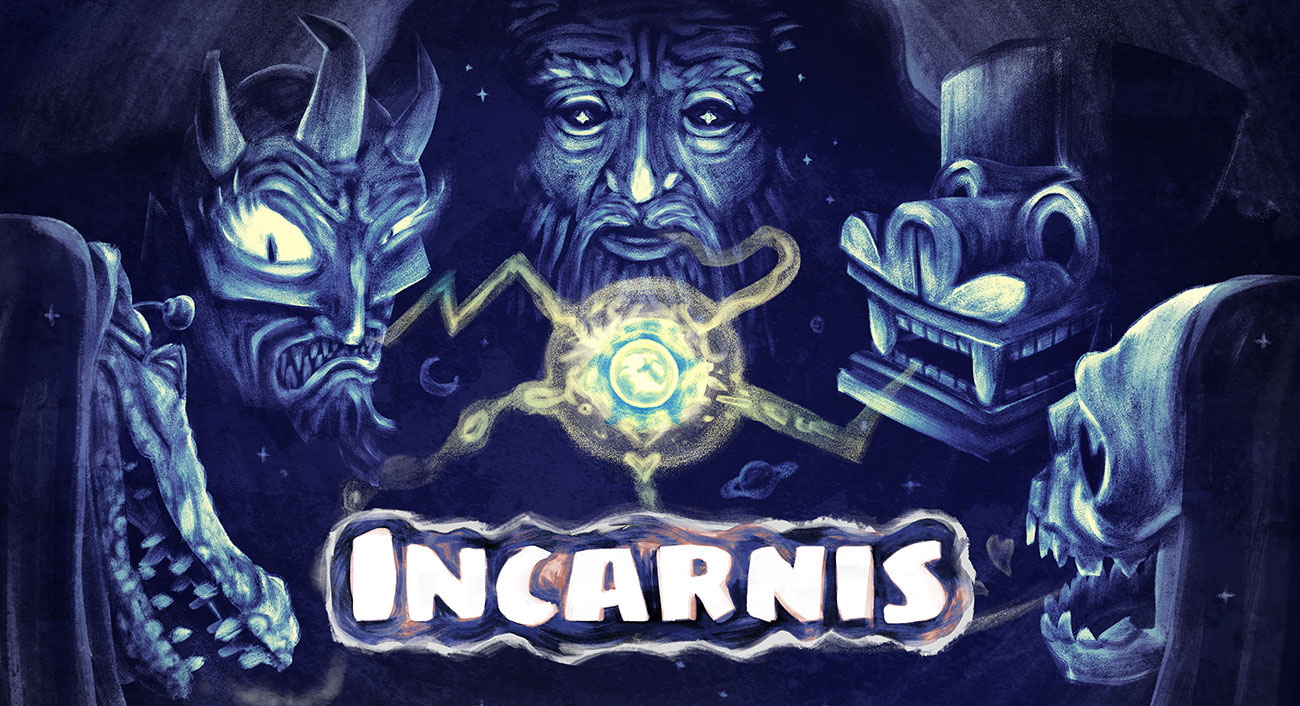
Incarnis
A downloadable tabletop RPG zine
"I really love the way the spotlight can shift between everyone so fluidly, allowing for everyone to be both player and gamemaster based on connections and drama within the shared imagination." ~ Scaryridge Creative House

Incarnis is a tabletop roleplaying game about a pantheon of gods who are all about interfering with each other's lives and with the world they created. Think of Disney's Hercules, Terry Pratchett's The Gods Trilogy and Neil Gaiman's American Gods. The gods are people; prone to being emotional and very interdependent. They just happen to be the almighty incarnations of raw creation as well. So, as your gaggle of gods pursue their individual needs, the world trembles in their wake, forever changed.
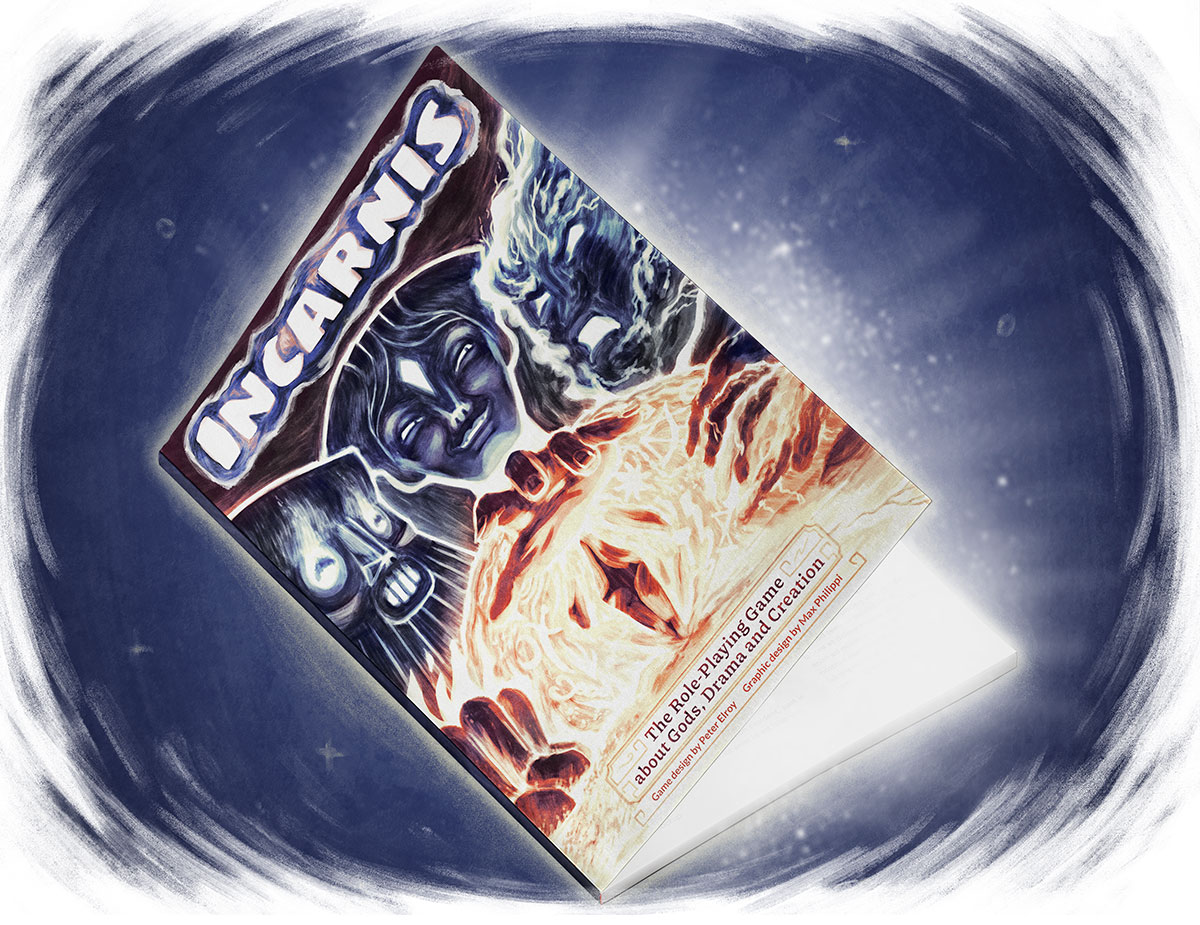
The 38-page, A5 booklet contains all the rules and flavour you need to create your own myth in a single session. It lets you switch the role of the challenger (much like a game master) between each scene, and helps you string your myths together into a wider mythos. Just add some markers, a stack of index cards and a bunch of six-sided dice (32 to be precice), and you're good to go. The game features god creation rules, emotional tensions between them for you to explore, additional deities for to play as your mythos unfolds, and interesting modules you can use to create an epic.
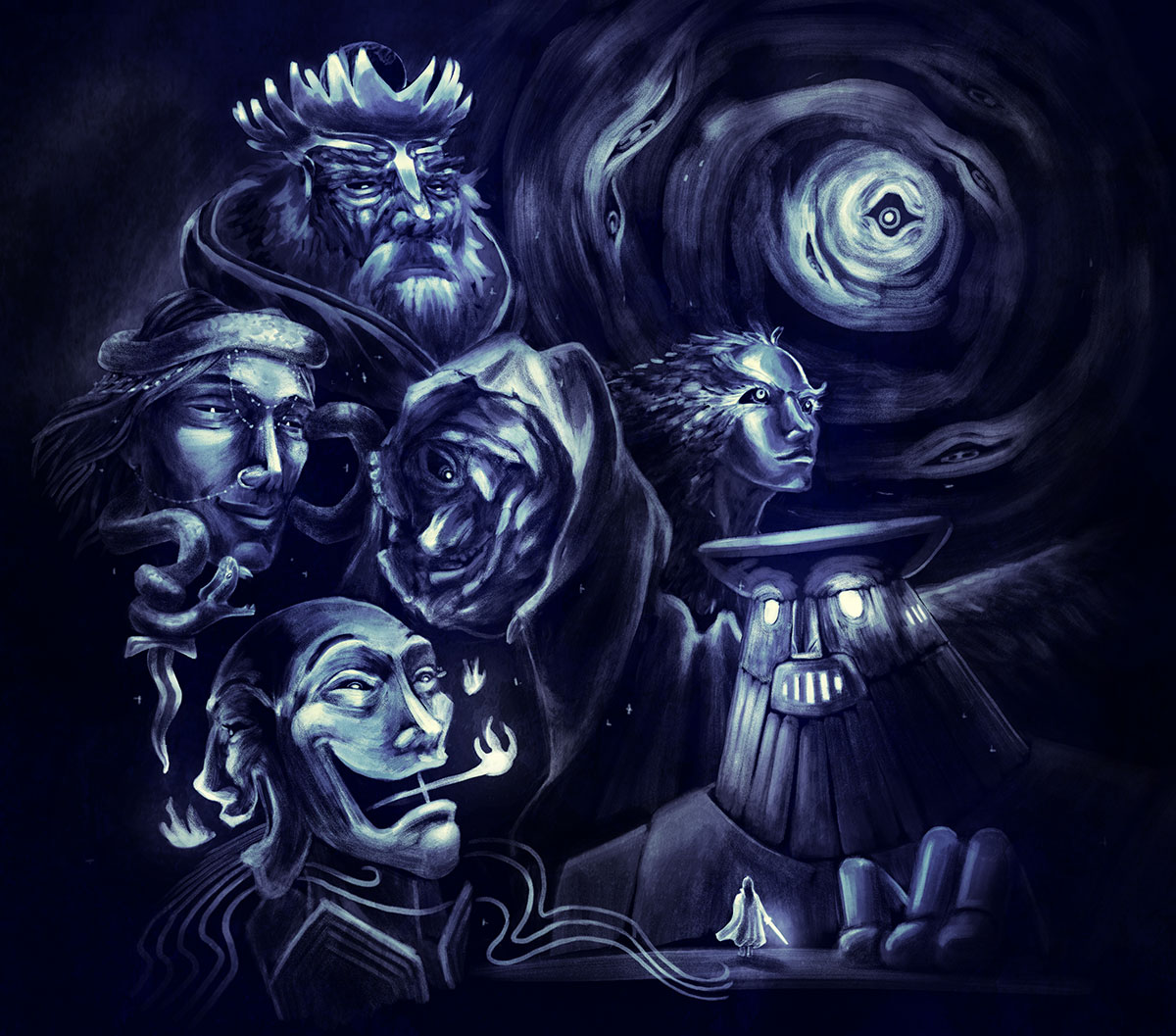
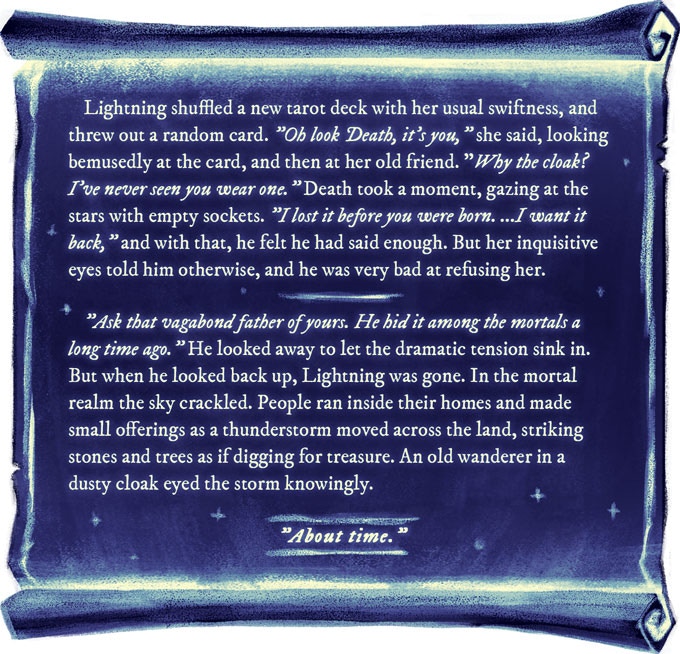

"The best part of RPGs - for me - is looking back at how the players changed the world. Incarnis is basically that, The Game." ~ A Tale of Dice, Youtube Channel
Incarnis lets you create your own origin myths by forming bonds between the gods. These bonds lead to drama that creates the world. With each myth, the world will become richer and more real. "Ocean and Earth were lovers, until something happened between them. Now they are in a terrible fight, and risk splitting apart." A simple premise like this can form the basis of myths such as how parts of the world became land, and other parts became ocean.
Your myths can grow into mythology. At the core of the game is the idea that each resolution creates its own complications. What if Ocean and Land reconciled their differences and merged again? What would happen to all the civilizations that formed on dry land? And will another god rise up to prevent this from happening? The game is built around this kind of drama and lets you spiral out an interesting overarching mythology by asking questions and searching for answers. Gradually, that abstract world you started out with becomes a place to call home.
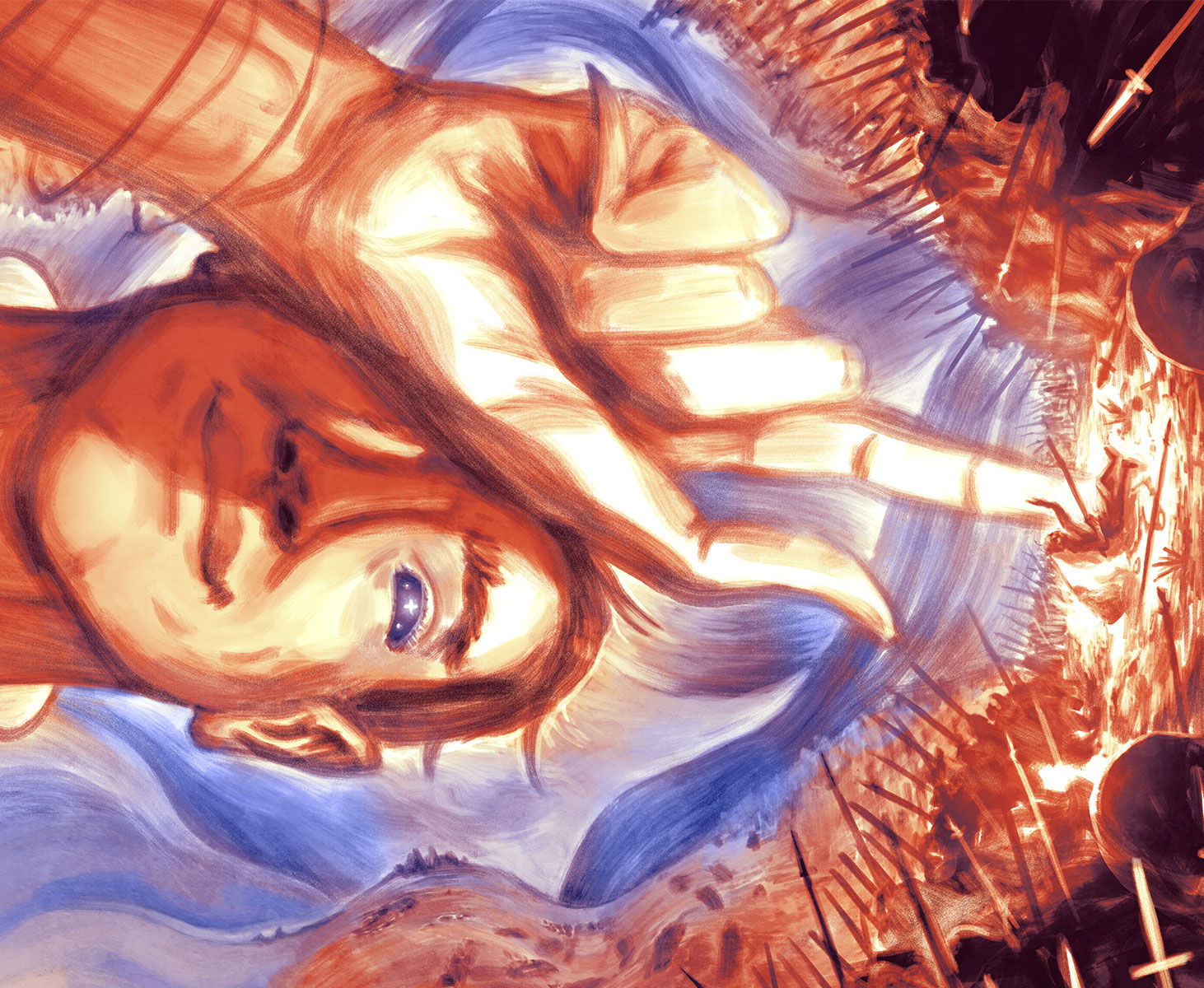
Physical copies
Physical copies are available from the following locations while stock lasts. Contact your preferred store if you would like them to stock this game. Upon proof of physical purchase, we will provide an Itch key free of charge.
- The Netherlands: Subcultures
- United Kingdom: Peregrine Coast Press
- Order a copy directy from Fanterland at FanterlandPress [at] gmail [dot] com.
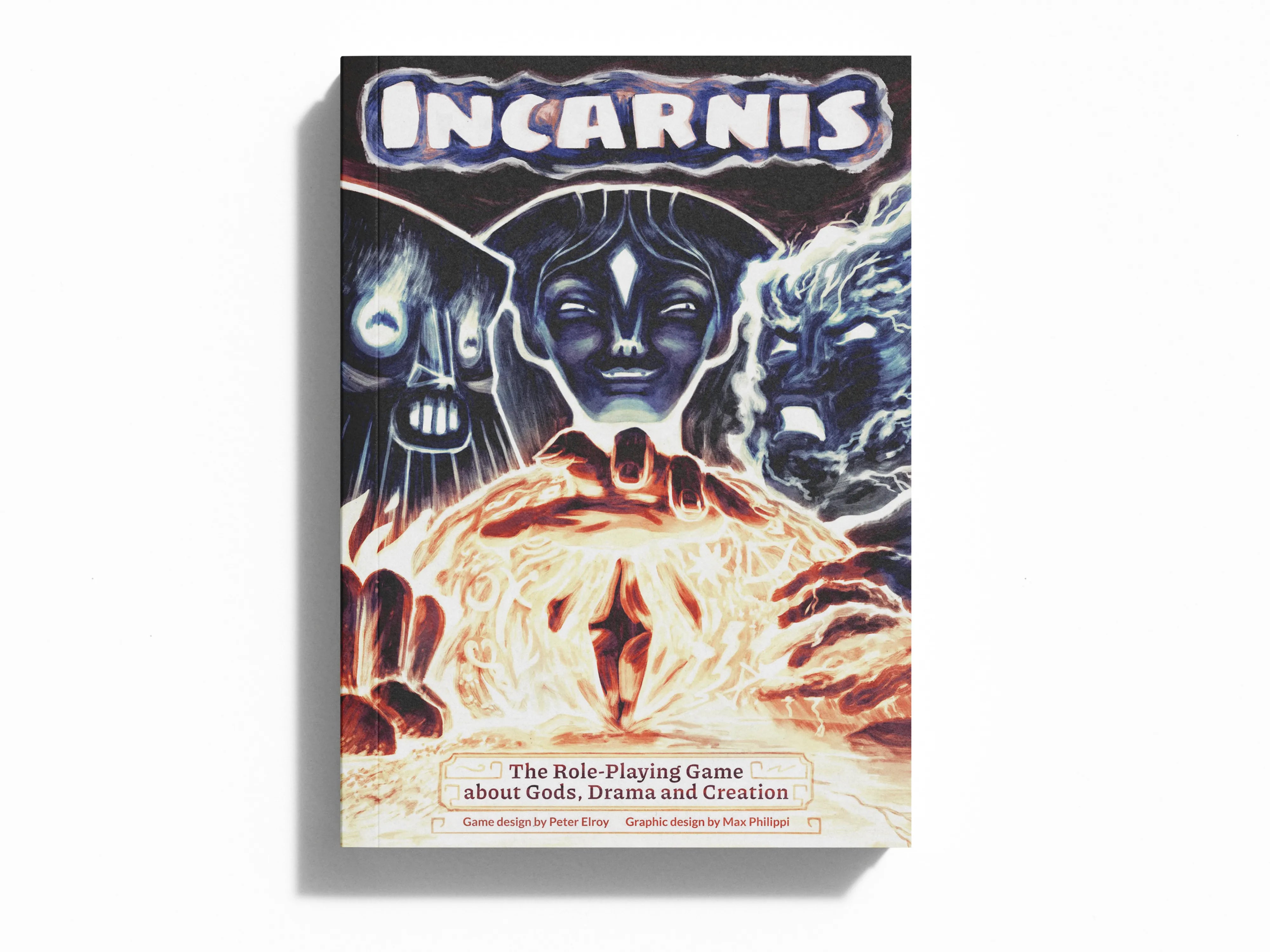
F.A.Q.
This section will be filled with more recurring questions once they come in.
Q: Is there a printer friendly version available?
A: Currently there is no printer-friendly version of the game. We designed Incarnis with the intention of creating very vibrant spreads, and made no compromises in this regard.
Q: Can I play this as a 2-player game?
A: Incarnis was play-tested as a 3-5 player game. However, the game's designer also enjoys playing it 1-on-1 with his wife. If you try a 2-player game, you'll have one tension towards the other player, and that player will have another tension towards you. Typically, that leads to both tensions becoming prominent in your shared scenes. Because Incarnis aims to give each tension 3 scenes, this means that it makes sense in a 2-player game to just play 3 scenes in total. This makes it a much quicker game (around an hour).
Want to see what we're currently working on, vote on new projects and receive exclusive extras? Subscribe to our newsletter now.
| Status | Released |
| Category | Physical game |
| Rating | Rated 4.8 out of 5 stars (5 total ratings) |
| Author | Fanterland |
| Genre | Role Playing |
| Tags | god-game, pantheon, rules-light, storytelling |
| Average session | A few hours |
| Languages | English |
Purchase
In order to download this tabletop RPG zine you must purchase it at or above the minimum price of $10 USD. You will get access to the following files:
Physical copy
Support this tabletop RPG zine at or above a special price point to receive something exclusive.
Physical copy
Receive a physical copy alongside the digital PDF. The listed price includes shipping. Please enter your shipping address.
Development log
- Introducing 'Feathertail Falls'Feb 20, 2023
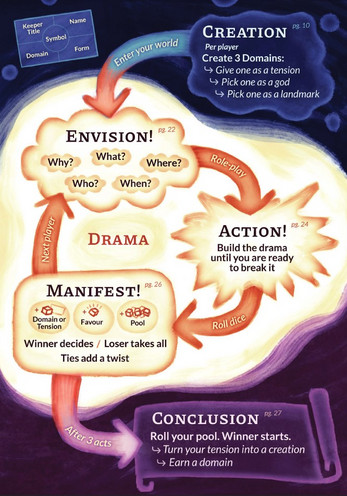
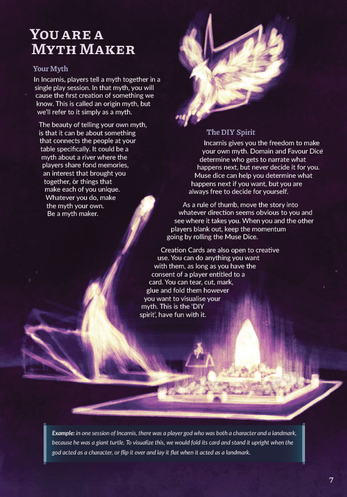
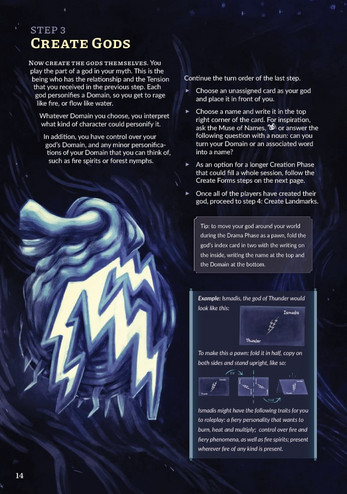
Comments
Log in with itch.io to leave a comment.
Hi, I bought a physical copy of Incarnis at RINCON yesterday, could I possibly get access to a digital version as well?
Hi JorisotB, I have sent you your key via the e-mail address listed on your website. Please enjoy.
I’ve got it, thanks!
I really wanted to get back to this page to write a review because this book is solid.
I've returned to Incarnis several times now. It promises a lot but it really does work! The system does have some wonky details that I have struggled to get my head around but whenever I have tried this game it has created a dramatic mythical saga out of our collective minds, and after an evening of dramatic twists and turns we've ended up with fantastic stories that really feels like they could originate from a story of a polytheistic pantheon.
The book is very demanding and the game owner probably needs to read it very thoroughly when playing it. I read it many times before our first game, and the very first turn took a very long time. But then it just clicked, the system just gave way and existed beneath us and the story progressed and people in the world acted and adventured and were tested to their core as the gods met and clashed and loved and feared and dreamed of perfection - and as true polytheistic deities, they failed despite their infallibility.
You should not expect to win, you only win if your story was good, and if so you all win because your evening was just that good. Dont expect to play this and have any capacities of "system analysis will enable me to win" because that will make you miserable - the game is NOT competitive. The system is a story guide that allows you to scale up your ability to change the world in a fantastic way. Its not a "game system" like a d&d but for gods. Its a one evening event to play incarnis and you will probably end up with a pretty epic story in that time. Dont be sad if your champion gets mauled by the monster just because another player said so, just roll with it. Sometimes the hero needs a reminder just who's boss, or maybe it was not his story, if was the story of the Sword of The Hero as it was passed down through the centuries, to be picked up aeons later by a boy who (you all retrospectively had to agree) turned out to be THE HERO of your collective story.
The story of the god who craved the marriage of a demigods daughter and she was hidden in glass forest from him. The story included heroes fighting over her destiny but in the end she needed to go to the Labyrith of Insanity to release the magic in order to stop the god of storms from devouring everything. It was a story of defiance and beauty.
The story of the City That Cried, a city of beautiful ideas and the spark of creation, that made technology and giants and steam punk'y monstrosities but as The Spark was bound to Laughter and Laughter was bound to a hostile god, the city of man developed a culture of ceremonious laughter, as creation was drained from their lives and inspiration was lost as it was institutionalised. The world never recovered and it was a story of loss and sorrow.
Games good. Buy it. Read it a million times and then please play it.
It's great to hear from you again Esben. Max and I fondly remember you checking in on the game's progression during development. It gives me so much joy to know Incarnis has enriched your storytelling. May the gods be with you!
I tried playing Incarnis solo and it worked pretty well. I created three characters/tensions and played three scenes, one for each pair. The included tables were helpful to randomize characters and landmarks.
I have two questions:
Hi ajstamm,
I've copied the reply to your question from the kickstarter comments below. I think you added a question on creating a new card here. The creature card represents the creature itself, so you can treat it as such. When the gods interact with it, you may change it to reflect any transformation it has undergone, as you would with any other creation.
Copy-paste of Kickstarter reply:
----------------------------------------------------------
Incarnis was not designed with solo play as a core focus, but it is something we want to encourage and support, so any feedback in this regard is much appreciated. The module Feuding Pantheons on page 34-35 includes automa which we think can be dropped into a solo game nicely to add some agency outside of your own control.
You are exactly right about the landmarks. In Incarnis, Domains are what make things mythical. So a 'mundane' city has a form (this could simply be 'city'), but does not have a domain yet. As you say, it can receive a domain during play and become something mythical. A Sky city, an underwater city or even a new god.
Fabled creatures are first and foremost creatures rather than places. During playtesting, we received feedback that it was confusing to call a creature a landmark, so we phrased this as a creature dwelling. Either way, the intention is simply that you create fabled creatures and give them a place in your play area. Feel free to move and change your creature around as your fiction demands!
We hope you have fun with the game. Please feel free to message us if you have any more questions or feedback.